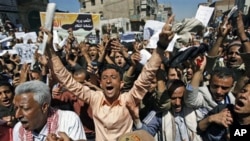Protests continue for a fifth day against the Yemeni government, with thousands marching in the capital Sana'a and meeting opposition from the police.
A crowd of mostly young demonstrators chanted slogans against the government of Yemen President Ali Abdallah Saleh for a fifth day. Reports from Sana'a say several demonstrators were injured in scuffles with police and government supporters.
Eyewitnesses say police tried to scatter the demonstrators by wielding batons, firing tear gas and using stun guns. But the crowds of mostly young people kept marching.
Analyst Stephen Steinbeiser of the American Institute for Yemeni Studies in Sana'a says he thinks the protesters belong mostly to Yemen’s educated classes.
"It seems that the protests against the president are really being led by opposition politicians, university professors, the kind of educated classes, and students ... and they are literally marching from the university and trying to get down other main roads, and they are actually, physically running into the supporters of the president, which are mainly tribesmen," said Steinbeiser.
Steinbeiser says President Saleh called Friday for his supporters to defend Sana'a’s symbolic Tahrir Square, immediately after Egyptian President Hosni Mubarak resigned.
"Very quickly, after the news broke that Mubarak left office, the president marshalled his tribal support, of which he has quite a bit in and around Sanaa, and he brought them to Tahrir Square in the capital, and just like in Cairo," said the analyst. "Tahrir Square in Sana'a, it is not as big, but it is kind of the main demonstration ground, and obviously it has huge symbolic value right now."
Steinbeiser stresses that the pro-government supporters are being offered incentives to remain in Tahrir Square and fend off the crowds of anti-government protesters.
"There are tents that are set up and these tribesmen have been receiving lunch, food, cash stipends and qat, and of the three qat is probably the most coveted gift for them. So when the anti-presidential protesters march down into Tahrir Square, then the pro-presidential tribesmen have kind of rebuffed them and keep them from actually entering the square and occupying it," said Steinbeiser.
Steinbeiser adds that President Saleh has fewer tribal supporters in the more southern parts of the country, where large demonstrations have been reported in Taiz and Aden.
The Associated Press says that President Saleh has met with a number of tribal leaders that support him since Saturday, in a bid to shore up his grip on power. He also indicated recently that he would not seek re-election when his term ends in 2013.
Protests Continue for 5th Day Against Yemeni Government




